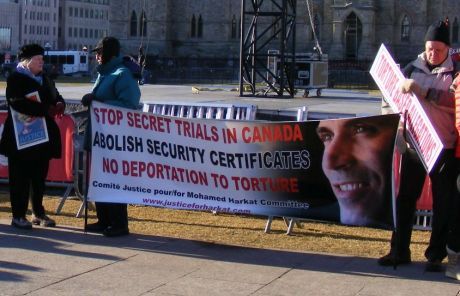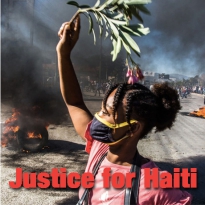Reports
You are here
No deportations to torture: let Harkat stay

December 15, 2017
On December 8, protesters outside Parliament Hill and speakers inside the Hill media room marked 15 years since the unjust arrest of UN Convention refugee Mohamed Harkat under a Canadian Security Certificate.
Declared unconstitutional in 2007 then reinstated with a minor alteration, Security Certificates allow for secret hearings where the accused and their lawyers are not allowed to see the heart of the allegations and evidence used against them. Security-cleared lawyers are allowed to see some of the secret case, but neither the detainee nor their public counsel is allowed to be present.
And mere weeks after Prime Minister Trudeau solemnly declared that "No one, ever, deserves to be tortured,” the protest and press conference drew attention to the fact that this is exactly what Harkat now faces after living in Canada since 1995: the federal government’s continued intention to deport him to torture in Algeria.
Yet more irony, Harkat was arrested on International Human Rights Day, December 10, 2002, and subsequently detained without charge for 3.5 years, often in solitary confinement. He has struggled under a brutal series of house arrest bail conditions and now continues to fight efforts to have him deported.
Though Harkat was arrested under the Harper security regime, the efforts of his supporters to appeal to the Liberal government to let him stay in Canada have so far gone unheeded—despite any ability to show that he presents any kind of threat.
“My husband has not only been unjustly detained or under surveillance for fifteen years, but has been repeatedly forced to justify that he is not a security risk, despite all evidence that he is not. CSIS did not even bother providing a risk assessment at his latest bail review: the last one they produced was back in 2009 and Moe was labelled a very low risk even then. Also, Canadian Border Security has never even bothered reading any of Moe’s risk assessments. I think it speaks volumes,” said Harkat’s wife Sophie Lamarche Harkat.
Speakers at the press conference represented the Campaign to Stop Secret Trials in Canada, Amnesty International, the International Civil Liberties Monitoring Group, the National Council of Canadian Muslims, and Monia Mazigh—human rights author and wife of torture survivor Maher Arar. They all drew attention to the fact that Canada, and now the Trudeau government, has obligations under the UN Convention Against Torture that it must live up to by letting Harkat stay.
The protest outside included student and labour activists, community groups, Canadian Unitarians for Social Justice, Solidarity Ottawa, the Raging Grannies, and others who demonstrate that Harkat’s persistence is matched by a community of supporters who refuse to allow his deportation to torture.
Section:










